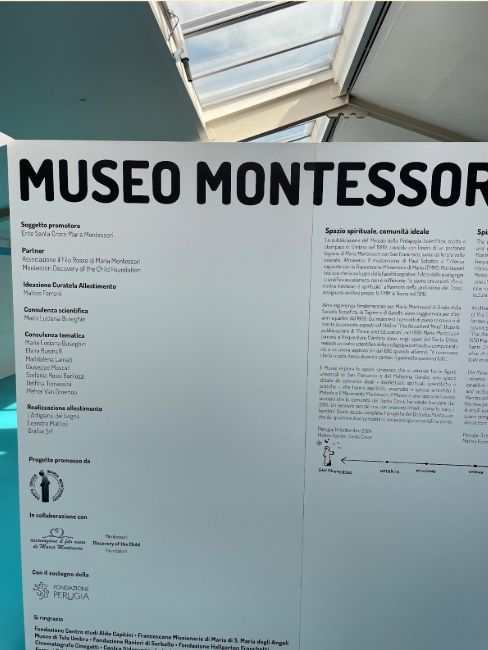My Incarnation
Meher Van Groenou grew up in a small village in central India, in a home surrounded by over 100 varieties of mango trees. “Our village had no electricity or running water,” she says, “and the nearest bus stop was 11 miles away. The only way to reach my grandmother’s house was by bullock cart. These are the fond memories of my childhood.”
Entertainment was simple there, and Meher spent her childhood hiking nearby hills, playing in a large well, and going to the weekly market.
Meher shares that her life “transformed dramatically” when she moved to the U.S. “I saw an airplane for the first time when I traveled to the United States,” she says. “I’ll never forget arriving in Chicago and seeing towering buildings with entire floors dedicated to parking garages. It was amazing! What that initial experience gave me is resilience, fearless curiosity, and the knowledge that we all have many possibilities hidden within us. That is why Montessori’s philosophy fascinates me!”
The Interconnectedness of Family and Montessori
Meher’s life was marked by a deep and broad curiosity, and her journey into Montessori education was deeply influenced by her late husband, Willem (“Bill”) Van Groenou, a Dutch professor and educator with a passion for exploring different teaching philosophies. With Maria Montessori having spent time in the Netherlands, he was naturally drawn to study her methods and introduced Meher to the Montessori approach.
Meher and Bill dedicated themselves to researching different approaches to education. Their shared passion led them to visit experimental schools in India and Europe, observing firsthand the diverse ways in which children could learn. Their global travel also opened doors for understanding and respecting other cultures, languages, and customs, essential for a truly peaceful world.
A key moment came for Meher with the birth of her daughter, her first child. “I guess that happens to most teachers when their child is born,” she reflects. “Then they really think seriously about what children need.”

Like many parents, she wanted to provide her two children with the best educational experiences, and this led her to seriously consider educational methods that nurtured a child’s natural curiosity and development. Montessori’s emphasis on independence, freedom for exploration, and respect for the child deeply resonated with her as both a mother and an educator.
The Invisible Thread of Montessori
The global Montessori community is geographically sprawling but tightly knit in mission and passion, with places and people connected by a multitude of invisible threads. One of Meher and Bill’s research trips took them to Ahmedabad, a place where she spent most of her teenage years. While Bill worked at the Global Centre for Environment and Energy, Meher decided to visit the campus where many Montessori trainings were held, and browse the library filled with Montessori’s works.
The campus architecture was mesmerizing—organic, deliberate. Designed by the renowned architect Balkrishna Doshi, the buildings were nestled beneath rolling hills, a natural cooling system against India’s relentless heat. Meher walked along the winding paths, the landscape gently folding around her, and before she knew it, she was lost.
As she paused to gather her bearings, a man approached. He was dressed in a crisp white kurta and cotton pants, his demeanor both unassuming and warm.
“Can I help you?” he asked. Meher smiled. “I think I may have lost my way. I was looking for the library.”
He nodded and gestured for her to follow with, “Let me take you there. What do you hope to find there?”
“I’m a Montessori teacher,” she explained. “I was hoping to find some of Maria Montessori’s books for children.”
At this, he stopped. Meher stopped, too, sensing a shift in the air.
“Do you know Mario Montessori?” he asked.
Meher blinked, caught off guard. “I don’t know him personally, but I know of him.”
A slow smile spread across the man’s face. “He was my godfather.”
For a moment, the world seemed to still. The weight of that revelation settled over Meher like a wave, sending shivers up her spine. She had not expected this—a chance meeting with Leenaben Sarabhai’s son, representing an invisible thread linking her path to Montessori’s own history.
Building the Legacy
Support Along the Way
Meher’s influences span a diverse range of educators, philosophers, and historical figures. Her mentor, Margaret (Peggy) Loeffler, played a significant role in shaping her approach to Montessori education by encouraging research within the classroom and ensuring Montessori terminology fit the needs of today’s families. Peggy’s emphasis on evolving educational language and ideas deeply resonated with Meher, reinforcing her curiosity and love for research.
Beyond the field of education, Meher was profoundly impacted by the philosophies of Mahatma Gandhi’s simple living; Jiddu Krishnamurti’s conscious living; and Rabindranath Tagore’s living with nature. Growing up in the city where Gandhi’s ashram was located, she was deeply influenced by his teachings on nonviolence and social change. She also engaged with Krishnamurti’s philosophical ideas by attending his lectures at Ojai, California.
Another key influence in Meher’s life was Leenaben (Leena) Sarabhai, a member of a prominent Indian family and an advocate for Montessori education. Meher was able to engage in deep conversations with Leena, discussing Montessori, philosophy, and education.
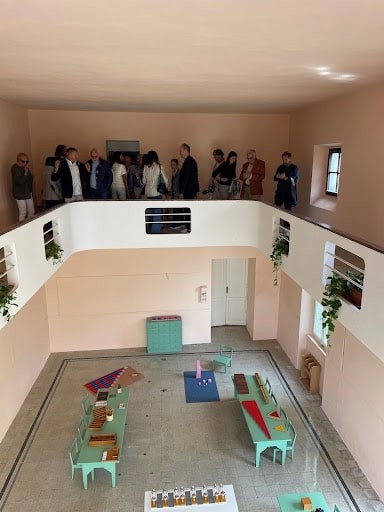
Leena’s family hosted Maria Montessori during her time in India, and their estate became a hub for educational discourse. Leena later founded Shreyas School, a Montessori-inspired institution in Ahmedabad that blends Montessori’s philosophy with Gandhi, Krishnamurti, and Tagore’s educational thoughts for the development of the whole child. The institution remains a testament to her vision. These rich conversations and experiences cemented Meher’s belief in education as a transformative force, blending tradition with progressive ideas.
Guiding Tomorrow’s Teachers: Inspiring Future Montessorians
A Dedication to Montessori Philosophy
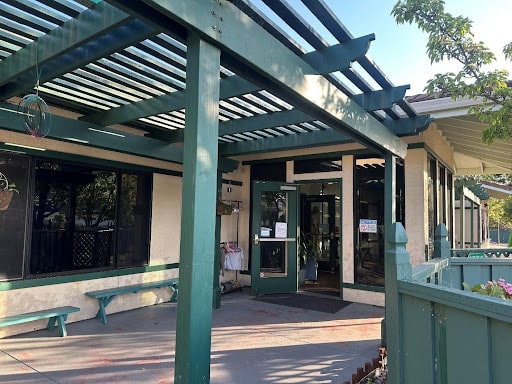
Meher’s career in Montessori education evolved through a series of organic yet purposeful transitions, each fueled by her deep commitment to learning and teaching. Throughout her nearly five decades working in Montessori education, Meher started as a parent volunteer and worked her way into the classroom first through substituting. As a former social worker and new mother, she felt the need for a change, not only because the world of social work drained her of her belief that she could make a true difference, but also because the world of Montessori was invigorating.
With newfound inspiration, Meher became a teacher’s assistant and eventually a lead teacher. Her dedication and vision for education eventually led her to a leadership position as a school director, a role that marked a significant turning point in her career. However, she soon realized she wanted more than just to lead—she wanted to create.
This desire led her to establish her own Montessori school, where she could design an environment that aligned with her educational philosophy—an open, collaborative space where teachers could easily support one another and where children could experience a more connected, dynamic learning atmosphere: Montessori School at Five Canyons in Castro Valley, CA. The school serves families of many cultures and languages, and the staff reflects that same diversity.
Beyond shaping a physical learning environment, Meher also recognized the importance of cultivating skilled and passionate Montessori educators who deeply understand Montessori philosophy. This realization led her to establish the Montessori Institute of Advanced Studies, a teacher education program that has thrived for over 20 years.
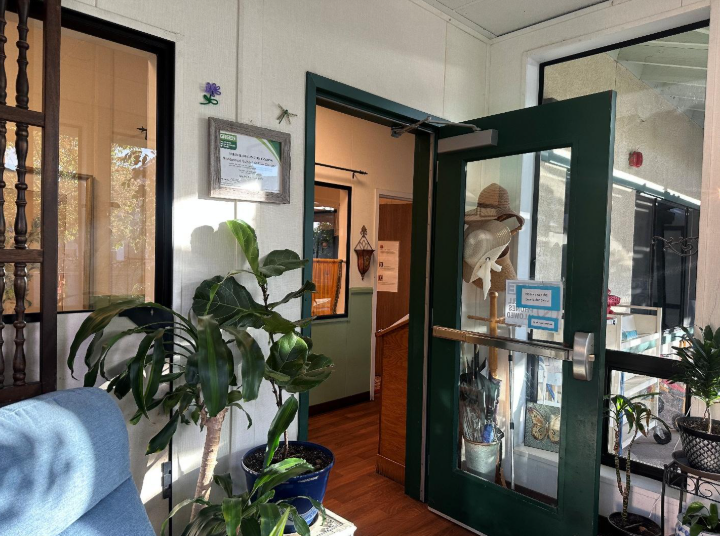
Teaching educators became a way for her to share her deep understanding of Montessori principles, emphasizing that Montessori philosophy is not merely theoretical but something that must be internalized and lived.
“I often tell the directors and teachers to first find peace within ourselves,” Meher says. “Discover your deeper potential,” she tells them. “Focus on the purpose behind each of your actions, and ponder how it will affect your overall goal and others around you. Work toward building a strong community.”
Words of Advice: Be Peaceful, Show Kindness, and Lead with Respect
Throughout her career, Meher has been guided by core values of curiosity, peace, authenticity, and human connection. She firmly believes that Montessori education is universal— transcending cultural and national boundaries—and that true education begins with recognizing and embracing the individuality of each person.
“We need to understand that peace is possible if each one of us centers it in us,” Meher reminds us. “Montessori’s idea of ‘respect for all’ is the basis for peace to be possible.”
She encourages educators to remain open, to seek understanding, and to break down the invisible walls that separate people based on background or identity. In her own legacy, she hopes to be remembered as someone who lived Montessori’s values while staying true to herself—curious, kind, and always open to learning from others.
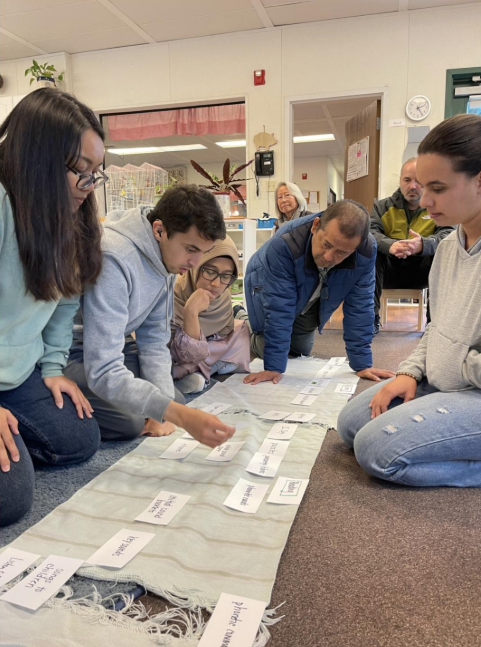
Meher has always believed that true mentorship begins with self-awareness and community building. In leading her school, she emphasizes the importance of inner peace, encouraging those around her to pause and reflect before taking on countless tasks. She advises her school directors and staff to always consider the purpose behind actions and their impact on students and teachers alike.
For Meher, creating a nurturing environment is not just about instruction—it is about fostering a sense of belonging among a diverse teaching staff. With educators from around the globe, she has consciously cultivated an atmosphere of inclusion, ensuring that every teacher feels valued and heard.
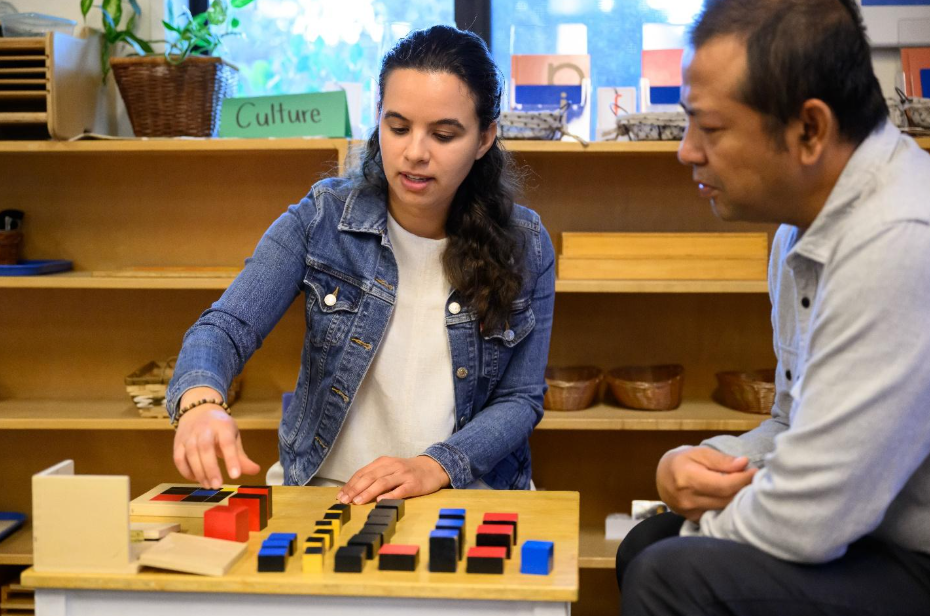
Beyond building community, Meher’s mentorship extends to her adult learners at the Montessori Institute of Advanced Studies. She instills in them a deep respect for Montessori philosophy, guiding them not just through coursework but through reflective practice.
If she notices a teacher implementing an approach that does not align with Montessori principles, she does not reprimand but instead asks questions: Why did you make that choice? How do you think the child felt? By prompting reflection rather than issuing directives, she encourages educators to internalize their learning and grow into thoughtful, compassionate practitioners.
Her mentorship is built on kindness, respect, and the unwavering belief that education should be a transformative journey for both teacher and student.
Today & Tomorrow
Meher’s journey in Montessori education has been shaped by the support and belief of a community that has walked alongside her. As she reflects on her career, she expresses deep gratitude for the mentors, colleagues, and friends who shaped her path, many of whom are no longer here but remain in her heart.
Looking forward, Meher plans to continue supporting the Montessori Peace Museum in Perugia, Italy, which opened in September 2024, with which she collaborated and to which she contributed her materials. She is also focused on completing her latest work, a book that captures the stories of those who had direct encounters with Maria and Mario Montessori. This endeavor serves as a testament to her lifelong dedication to preserving and sharing the rich history and values of Montessori education.
